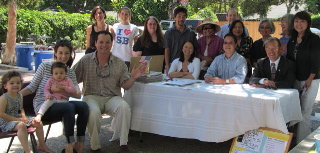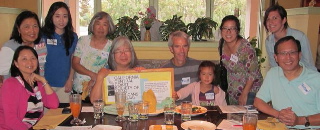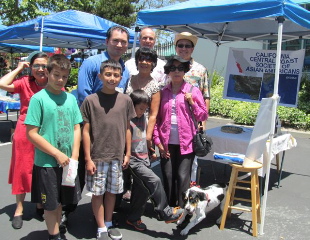Central Coast Asian Americans unite
to celebrate their roots and for better citizenship



In the aftermath of the Boston Marathon bombings, many got to thinking about immigrant assimilation into the mainstream.
Happily, earlier this year before the tragic incident, local Asian Americans have been coming together in Santa Barbara — for historical, socio-cultural and good citizenship goals.
Consider some statistics:
Asian Americans comprise 4.8% of the U.S. population. They are sometimes characterized as a model minority because many of their cultures encourage a strong work ethic, a respect for elders, a high degree of professional and academic success, a high valuation of family education and religion. They have historically been the target of violence based on their race and ethnicity. (Wikipedia)
Asian Americans are the highest-income, best-educated and fastest-growing racial group in the U.S, with Asians now making up the largest share of recent immigrants.(Pew Research)
In the Central Coast, however, one does not see very many Asians Americans, except in the school campuses of UCSB and SBCC, and as tourists in downtown Santa Barbara and other key cities of the area.
California Central Coast Society of Asian Americans (CCCSAA) is now in its birthing process — “to celebrate our similar geographic origins with diverse cultures but strong ethnic ties with the vision for ourselves and our future Asian Americans to better appreciate our common cultures, ethnicity and geographic origins to be better, more tolerant and globally-oriented U.S. citizens.” It aims to make its constituents more productive, relevant and responsible members of the American society.
Thus, its call to residents of the Central Coast — in the Tri-counties (Santa Barbara, Goleta, Montecito, Summerland, Carpinteria, Ventura, Oxnard plus Camarillo and Thousand Oaks); or in the North counties (Solvang, Santa Ynez, Buellton, Arroyo Grande, Gualadupe, Pismo Beach, Santa Maria, San Luis Obispo); who are of Asian descent including the Northeast (China, Japan, Korea, Taiwan, Hong Kong, Macau, Mongolia,); the Southeast (Cambodia, Laos, Thailand, Vietnam, Brunei, Malaysia, Myanmar, Indonesia, Singapore, the Philippines, Christmas Island,); the South (India, Bangladesh, Nepal, Pakistan, Sri Lanka, Tamil); or the Pacific Islands (Melanesia, Micronesia and Polynesia).
In May, CCCSAA had a registry at Santa Barbara’s Mesa Spring Fest, then a celebration dinner of the Asian Pacific Islander Heritage Month.
On July 13th, it had the first of its series of charter membership meetings. The potluck lunch was held at EF International Language Centers (a big supporter of CCCSAA) on Chapala St.
Keynote was by Prof. John S.W. Park, Ph.D., chair of the Dept. of Asian American Studies and The Center for New Racial Studies in UCSB who spoke on: What is the Asian American story? He is an author of three books on immigrants, including one co-authored by his brother Dr. Edward J.W. Park entitled Probationary Americans: Contemporary Immigration Policies and the Shaping of Asian American Communities.
Dr. Park cited how the profile of immigrants from Asia has dramatically changed with the switch from the basic humanitarian concern and family unification to the 1990s policies that focused on professionals and the high tech- skilled. He described the new policies to be “much more calculating, more on the cost-benefit perspective” that basically exclude the poor.
The UCSB professor pointed out that Asian immigrants in the category then made up about 60% of the U.S. immigrants, and many of them “adjusted” their status, outnumbering those who came from foreign countries.
Dr. Park, who grew up in Los Angeles, also related how his single mother migrated from Korea, sponsored by their aunt. He was then just five years old. Today, both he and brother Ed (also chair of Asian American Studies, Loyola Marymount U in Los Angeles) have doctorates and devote their work in the academe.
Carpinteria Councilmember Wade Nomura spoke on Asian American leadership. He cited three basic characteristics that a good leader must possess: adaptability – able to change and not have preconceived opinions; discipline- not taking things personally and strong when times are most difficult; and respect – the willingness to listen to all viewpoints.
“Freedom of speech, our First Amendment right, is taken away if we do not listen to what is being said, “ Councilmember Nomura pointed out. “Listening is practicing respect.”
He declared. “A public servant must serve the public, and not be self serving.” He further stated: “Great leaders are those who unselfishly do things to benefit others –and protect the rights of others.”
Coming from one of the many Japanese American farmer families in Santa Barbara, Councilmember Nomura etched his marks on his every field of endeavor -with his world-renowned Nomura bike, his successful landscaping business, and his trendsetting work with the Rotary Club. He came to the CCSAA event with wife Roxanne, who is also a very active Rotarian.
Terease Chin, VP /Senior Trust Officer of Montecito Bank & Trust who is of Chinese descent, talked about how CCCSAA can collaborate with Santa Barbara Trust for Historic Preservation (SBTHP) on its projects for the Asian American community.
There’s Jimmy’s Oriental Garden which the SBTHP recently purchased to help interpret the history of the Asian American community in the Presidio neighborhood. Sharing Our Common Ground has a three-part community lecture series discussing the Asian American history in the Presidio and greater S.B. areas. Its Fourth Annual Asian American Film Series had 7pm screenings at the Alhecama Theatre, 914 Santa Barbara St (on July 12 – Somewhere Between; July 19 – I Am Bruce Lee; and another on July 26 – The Cats of Mirikitani ) www.sbthp.org, 805. 965-0093.
Born in San Francisco and raised in Santa Barbara, Chinese/Filipino-Irish Shamus Murphy shared his experiences as a first generation Asian American, which as TV/film producer, he recorded in his documentary “Anchor Baby.” His vision for Shamus Entertainment is to one day “bring back the film industry to our town, in the spirit of the Flying A studio from the 1920’s.” Shamus brought his children, whom CCCSAA encourage to participate in every function.
CCCSAA prime movers are Michael Cheng, Terease Chin, Amy Rhiger and Alice San Andres-Calleja.
The next charter membership meeting is on September 17th.
Contact: mikecheng3@verizon.net, 689-6700 or themesapaper@gmail.com, 845-6870

